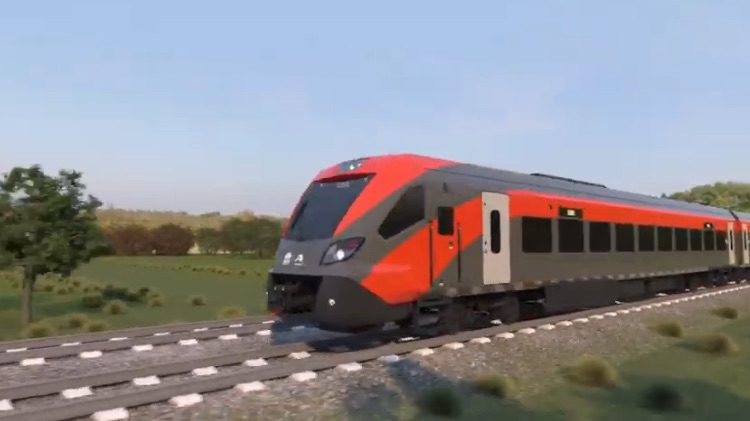The New South Wales state government has announced plans to roll out a new fleet of hybrid electric passenger trains for the state’s regional lines that will cut diesel pollution and running costs by using bi-mode technology.
The technology – as illustrated in the video below – allows the trains to connect to overhead power lines for as long possible, and then switch to diesel fuelled engines when the electrified networks come to an end.
The government says the fleet of 29 new trains – the first of which will be rolled out progressively from 2023 – will deliver fuel savings of around $2 million a year, and cut diesel pollution by 3 tonnes a year. They will also be significantly quieter for passengers when running on electric power only.
The diesel-electric trains will be maintained at a new facility to be built in the regional centre of Dubbo.
“We are leading the charge for more efficient and sustainable regional rail travel, with our new fleet being built with diesel-electric bi-mode technology, which is an Australian first,” said NSW minister for regional transport Paul Toole.
“This means when our trains enter electrified parts of NSW’s rail network they can connect to overhead power, which will see around $2 million in annual savings on the cost of diesel fuel.
“NSW’s electrified network reaches as far as Broadmeadow in the north, Lithgow in the west, Kiama in the south and Macarthur in the south west.
“Our new fleet will also have low emission diesel engines for travel along non-electrified sections of the rail network.”
The shift to the bi-mode technology is a definite improvement on the current stock of diesel-only powered trains, but at also suggests the government has no plans to fully electrify the state’s regional train routes, or look for ways to ditch diesel fuel altogether.
Other technologies being developed include trains that use renewable hydrogen fuel instead of diesel, and German company Bombardier Transportation last year launched a battery-operated train, to run on the country’s 40 per cent share of non-electrified routes.
In Ireland, Irish Rail in June announced plans to shift its train fleet from diesel to electric, starting with a massive tender for up to 600 hybrid and battery electric powered carriages over a 10-year contract.
The company said it expected electricity-powered trains to make up the overwhelming majority of train orders in the future, but noted that the tender process would provide for a possible first tranche of battery-electric hybrid trains, to ensure a smooth transition.
The contract for the new NSW rolling stock was awarded to Momentum Trains in February this year – international consortium comprising CAF, UGL Rail Services, Pacific Partnerships, CAF Investment Projects and DIF Infrastructure V Coöperatief.
The deal included project financing, designing, building and maintaining the new regional rail fleet as well as designing, building, maintaining and operating the new purpose-built fleet maintenance facility in Dubbo.

Sophie is editor of One Step Off The Grid and deputy editor of its sister site, Renew Economy. Sophie has been writing about clean energy for more than a decade.

